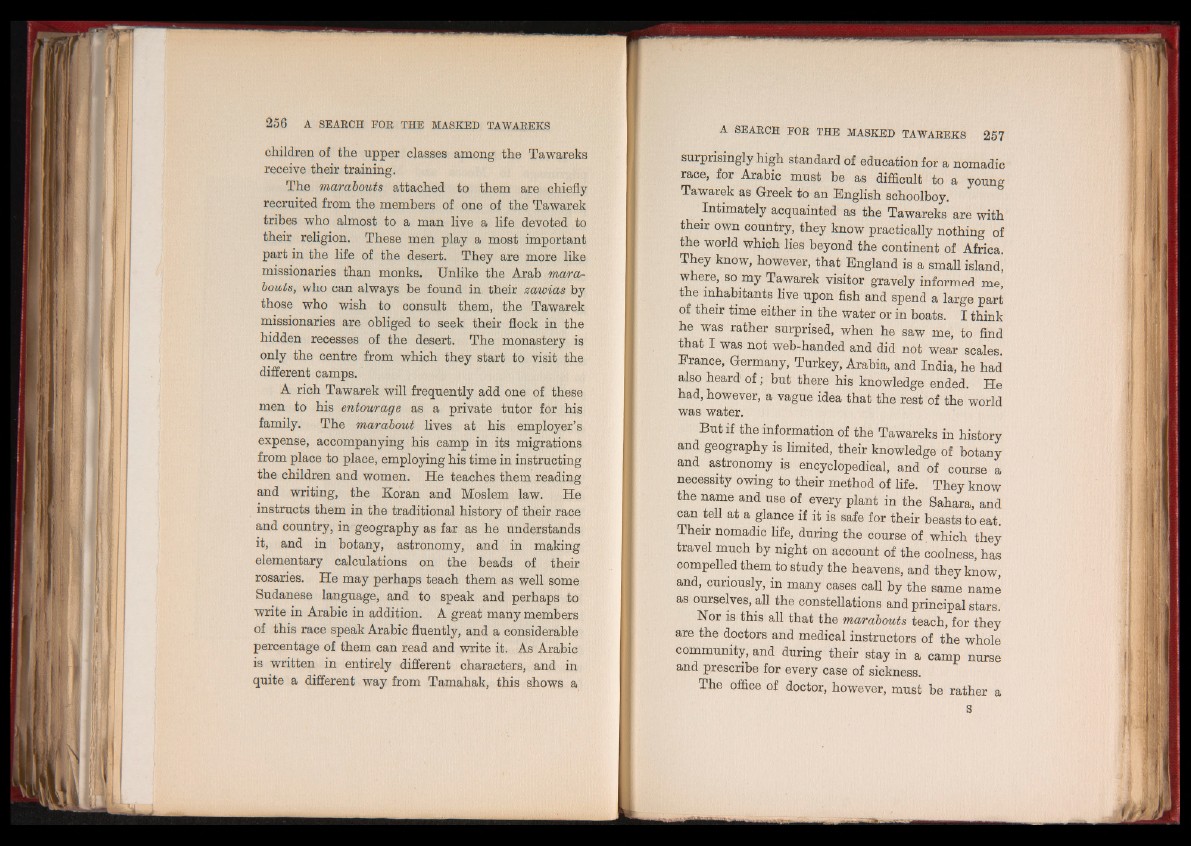
children of the upper classes among the Tawareks
receive their training.
The marabouts attached to them are chiefly
recruited from the members of one of the Tawarek
tribes who almost to a man live a life devoted to
their religion. These men play a most important
part in the life of the desert. They are more like
missionaries than monks. Unlike the Arab marabouts,
who can always be found in their zawias by
those who wish to consult them, the Tawarek
missionaries are obliged to seek their flock in the
hidden recesses of the desert. The monastery is
only the centre from which they start to visit the
different camps.
A rich Tawarek will frequently add one of these
men to his entourage as a private tutor for his
family. The marabout lives at his employer’s
expense, accompanying his camp in its migrations
from place to place, employing his time in instructing
the children and women. He teaches them reading
and writing, the Koran and Moslem law. He
instructs them in the traditional history of their race
and country, in geography as far as he understands
it, and in botany, astronomy, and in making
elementary calculations on the beads of their
rosaries. He may perhaps teach them as well some
Sudanese language, and to speak and perhaps to
write in Arabic in addition. A great many members
of this race speak Arabic fluently, and a considerable
percentage of them can read and write it. As Arabic
is written in entirely different characters, and in
quite a different way from Tamahak, this shows a
surprisingly high standard of education for a nomadic
race, for Arabic must be as difficult to a young
Tawarek as Greek to an English schoolboy.
Intimately acquainted as the Tawareks are with
their own country, they know practically nothing of
the world which lies beyond the continent of Africa.
They know, however, that England is a small island,
where, so my Tawarek visitor gravely informed me,
the inhabitants live upon fish and spend a large part
of their time either in the water or in boats. I think
he was rather surprised, when he saw me, to find
that I was not web-handed and did not wear scales.
France, Germany, Turkey, Arabia, and India, he had
also heard of; but there his knowledge ended. He
had, however, a vague idea that the rest of the world
was water.
But if the information of the Tawareks in history
and geography is limited, their knowledge of botany
and astronomy is encyclopedical, and of course a
necessity owing to their method of life. They know
the name and use of every plant in the Sahara, and
can tell at a glance if it is safe for their beasts to eat.
Their nomadic life, during the course of which they
travel much by night on account of the coolness, has
compelled them to study the heavens, and they know,
and, curiously, in many cases call by the same name
as ourselves, all the constellations and principal stars.
Nor is this all that the marabouts teach, for they
are the doctors and medical instructors of the whole
community, and during their stay in a camp nurse
and prescribe for every case of sickness.
The office of doctor, however, must be rather a